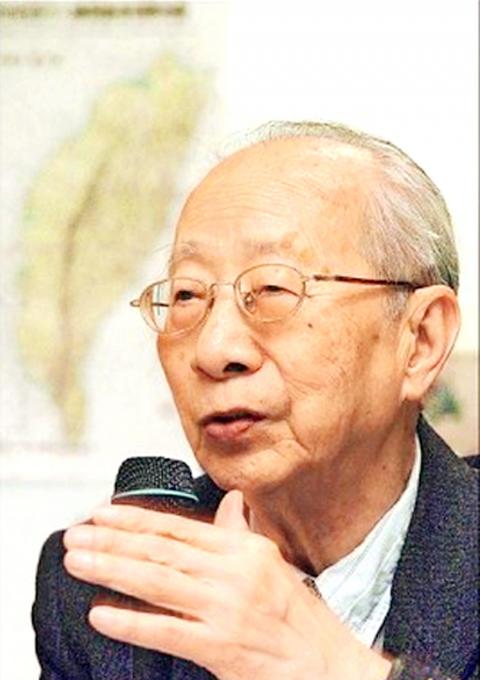Tsao Yung-ho (曹永和), an esteemed researcher who specialized in Taiwanese history at Academia Sinica, passed away on Friday in Taipei from multiple organ failure at the age of 94.
Tsao succeeded in his academic career by teaching himself. Born in 1920 to a wealthy family, Tsao read voraciously as a child, and absorbed large amounts of extra-curricular material with a particular interest in history, literature and philosophy.
After graduating from the Second Middle School of the Taipei State, the predecessor to the Taipei Municipal Chenggong High School, Tsao resisted social pressure to go to medical school and ended up not receiving a college education.

Photo: Liu Hsin-de, Taipei Times
Tsao chose to work in the National Taiwan University library and worked there for 38 years until he retired.
During his time at the library, Tsao worked with texts in a variety of languages and became fluent in Japanese, English and Dutch, and was also familiar with Spanish, German and Latin.
One of the few Taiwanese historians able to understand multiple foreign languages, Tsao made great contributions to research into early Taiwanese history. Some historians have said of Tsao that “If it were not for him, there would be no research into Taiwanese history.”
Tsao proposed in 1990 that Taiwan’s history should be approached via “a marine concept,” which was a departure from the “mainland concept” through which Taiwanese history had been viewed until then.
The approach sought to define the role of Taiwan in terms of marine transportation and trade beginning in the 17th century, when the Dutch first took over the island through the Dutch East India Company.
Tsao further expanded on the theory during the Martial Law era in 1950, bringing Taiwanese history to the attention of international historical researchers.
According to National Taiwan University history professor Chou Wan-yao (周婉窈), Tsao had a broad view of Taiwanese maritime history due to studying Dutch texts, adding that Tsao was a prominent figure in the field of Taiwanese history and had mentored key researchers such as Chung Shu-min (鍾淑敏), Chen Tsui-lien (陳翠蓮) and Lee Wen-liang (李文良).
Tsao became a member of the Academia Sinica, the nation’s top research institute, when he was 65 years old.
“Tsao was a gentleman who was courteous, kind and somewhat laconic,” Academia Sinica vice president Wang Fan-sen (王汎森) said
Although he had kept up with the times and attended the 2012 rally against media monopolization, Tsao never raised his arms or shouted slogans, but instead chose to quietly pay attention to the pulse of history and the culture of Taiwan, to embrace with a warm smile the island that he called home in a turbulent world, Academia Sinica member Wu Jui-jen (吳叡人) said.
Wu added that Tsao was quite enamored with The Blue Bird by Belgian author Maurice Maeterlinck, especially the line “happiness is where we are, in our homes.”

Trips for more than 100,000 international and domestic air travelers could be disrupted as China launches a military exercise around Taiwan today, Taiwan’s Civil Aviation Administration (CAA) said yesterday. The exercise could affect nearly 900 flights scheduled to enter the Taipei Flight Information Region (FIR) during the exercise window, it added. A notice issued by the Chinese Civil Aviation Administration showed there would be seven temporary zones around the Taiwan Strait which would be used for live-fire exercises, lasting from 8am to 6pm today. All aircraft are prohibited from entering during exercise, it says. Taipei FIR has 14 international air routes and

The Ministry of National Defense (MND) today released images of the military tracking China’s People's Liberation Army (PLA) movements during the latest round of Chinese drills around Taiwan. The PLA began "Justice Mission 2025" drills today, carrying out live-fire drills, simulated strikes on land and maritime targets, and exercises to blockade the nation's main ports. The exercises are to continue tomorrow, with the PLA announcing sea and air space restrictions for five zones around Taiwan for 10 hours starting from 8:30am. The ministry today released images showing a Chinese J-16 fighter jet tracked by a F-16V Block 20 jet and the

Snow fell on Yushan (Jade Mountain, 玉山) yesterday morning as a continental cold air mass sent temperatures below freezing on Taiwan’s tallest peak, the Central Weather Administration (CWA) said. Snowflakes were seen on Yushan’s north peak from 6:28am to 6:38am, but they did not fully cover the ground and no accumulation was recorded, the CWA said. As of 7:42am, the lowest temperature recorded across Taiwan was minus-5.5°C at Yushan’s Fengkou observatory and minus-4.7°C at the Yushan observatory, CWA data showed. On Hehuanshan (合歡山) in Nantou County, a low of 1.3°C was recorded at 6:39pm, when ice pellets fell at Songsyue Lodge (松雪樓), a

City buses in Taipei and New Taipei City, as well as the Taipei MRT, would on Saturday begin accepting QR code payments from five electronic payment providers, the Taipei Department of Transportation said yesterday. The new option would allow passengers to use the “transportation QR code” feature from EasyWallet, iPass Money, iCash Pay, Jkopay or PXPay Plus. Passengers should open their preferred electronic payment app, select the “transportation code” — not the regular payment code — unlock it, and scan the code at ticket readers or gates, General Planning Division Director-General Liu Kuo-chu (劉國著) said. People should move through the